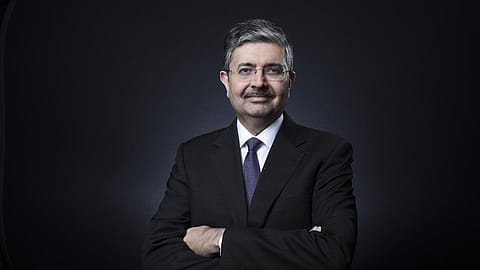Uday Kotak in no hurry to unlock value in subsidiaries
Founder-CEO feels an integrated bank is a better proxy to play India financial services story and counter cyclicality

Sum-of-the-part is how analysts on the street value stocks of diversified financial institutions, especially banks such as Kotak Mahindra Bank (KMB). But for investors who are hoping to see the bank unlock value in its subsidiaries including the mutual fund, life insurance, and securities businesses, the wait may be endless. Uday Kotak, the founder-CEO who is set to step down from an active role by this year end, tells Fortune India that the bank is in no hurry to list any of the businesses.
“My view is that there's a huge power of One Kotak, with each business acting as a natural hedge against the other. Banking profit comes with risk capital, while a lot of the other profits don't come with the same level of risk capital. If we act on an M&A transaction or an investment banking deal, the fees we earn is not with risk capital, but reputational capital, it's knowledge capital. So, in this firm, in addition to risk capital, we deeply value knowledge capital of professionals for building a business,” says the 64-year-old.
A few analysts have valued the bank’s five businesses at ₹624 on a SOTP basis, and post holding company discount of 20%, the highest value per share is assigned to the life insurance business, followed by the securities business, and the mutual fund business. Of the over ₹15,000 crore consolidated profit for FY23, the bank continues to account for a majority at ₹10,939 crore (72%), and of the subsidiaries, life insurance has contributed the maximum share at ₹1,053 crore (7%), followed by the securities arm at ₹865 crore (5.75%) and Kotak Mahindra Prime at ₹829 crore (5.51%). Only the general insurance business is a drag on the combined P&L, incurring a loss of ₹117 crore during the year.
Pointing out to the resilience of consolidated profit, Kotak says, “For most of the larger players, 95% of their consolidated profits come from banking. In our case, only 70% comes from banking, while the rest comes from other businesses. This means we have a much more holistic financial services model.” At a run rate of ₹4,532 crore consolidated profit reported in Q4, the bank is on path to report an annualised profit (pre-tax) of ₹25,000 crore. “The firm is making serious cash flows on a 23% capital adequacy. We are generating a surplus for our investors and have a model which is not drying up on capital. Every few years I don't have to go to the market and raise capital. How many banks in the world can grow at 20% plus and not need capital?” emphasises Kotak.
More importantly, Kotak believes the volatility in profits is taken care of by other businesses. “Last year (FY23) our banking profits went up because the spreads increased. Similarly, the year-ago (FY22) as the capital markets business did well but were a little subdued this year (FY23). So natural hedge from the point of view of the investor,” believes Kotak.
In fact, citing an instance where a foreign fund manager broached the topic of value unlocking, Kotak countered the manager by asking whether he had enough expertise while investing in Chile, in China as well as Indonesia. “I told the fund manager that our cut is India financial services, and Kotak Bank offers a unique concentrated bet to play the theme.” Currently, foreign portfolio investors hold 39.42% in the bank, while domestic institutions hold 10.99% stake. With a market cap of ₹3.72 lakh crore, KMB remains the most expensive banking stock in the country at over 4.5x price to book value. Incidentally, ICICI Bank is taking its listed securities business private with public shareholders of ICICI Securities being allotted 67 equity shares of the bank for every 100 equity shares of I-Sec.
The only caveat Kotak adds to his thesis is that his view of a consolidated entity is for now. In future, the management will always review. “It'll be wrong for us to say never. We can change our view as we go forward. But that doesn't mean that we don't want efficiency in each of these businesses and will continue to benchmark them with the publicly listed companies in that space. But unlike others, an investor in our bank is 100% owner of all the other businesses as well,” says Kotak.